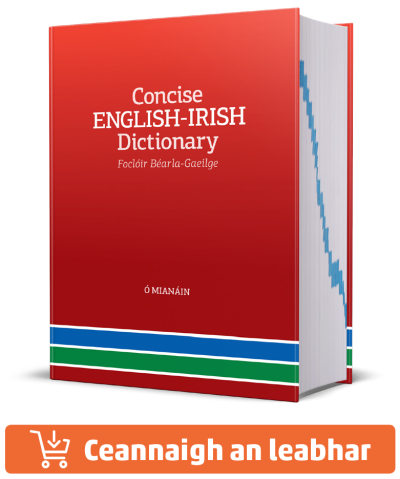Foclóir Gaeilge–Béarla
Ó Dónaill, 1977
An Foclóir Beag
Ó Dónaill & Ua Maoileoin, 1991
English–Irish Dictionary
de Bhaldraithe, 1959
Gramadach
Foghraíocht
dhein
dhera
dhi
dhíb(h)
dhínn
dho
dhó
di
dí
dí-
dia
dia-
dia-aithis
dia-aithiseach
diabáis
diabhach
diabhailíneach
diabhal
diabhaldánacht
diabhalta
diabhlaí
diabhlaíocht
diabhlánach
di. 1 : de1. 2 : do3.
CUARDACH DROIM AR AIS
IN FOCLÓIR GAEILGE—BÉARLA
ABAIRTÍ
IN FOCLÓIR GAEILGE—BÉARLA
Ní raibh sé sásta faoi rá gur inis mé di é, he was not pleased that I told her.
D’~ an t-ainm di, the name stuck to her.
do) Rugadh leanbh, duine clainne, di, she bore a child.
Rug sí mac óg; rugadh mac óg di, she had a baby boy.
3. Rinne an ghráinneog ~ di féin, the hedgehog curled itself into a ball.
Rinneadh ~ di, a marriage was arranged for her.
Ba mhór an ~ di é, it was a great comfort, consolation, to her.
Is iomaí ~ a chuireas an óige di, a young person goes through many phases.
B’éigean di ~ a chur ar an obair, she had to gather help for the work.
Bhí ~ aige di, he had sexual intercourse with her.
Má chuireann sí an oíche di, if she survives the night.
Ná ~ cailín aimsire di, don’t treat her as a servant girl.
Rinne siad peata di, they made a pet of her.
Rinne bean di, she became a woman.
Thug sé ~ póg di, he smothered her with kisses.
Is ~ di a bheith cineálta, it is in her nature to be kind.
Bhí ~ aige di, he had knowledge of her.
~eann an gorm go breá di, the blue becomes her well.
D’imigh an ~ di, she stopped clocking.
Tabhair ~ an tseoil mhóir di, give her full sail.
~adh luach a deor di, she was rewarded for her tears.
Shaolaigh an bhanaltra mac di, the nurse delivered her of a son.
Is olc an chearc nach ~ann di féin, ‘it’s a poor hen that will not scratch for itself.’
Bhí rud éigin á thaibhsiú di, she had a foreboding of sth.
Thug mo chroí ~ di, I grew fond of her.
Níl aon bhiseach ag teacht di fós, she is not getting any better yet.
Cad é mar a chuaigh an scéala di? How did she take the news?
Thogh sí culaith dheas di féin, she picked out a nice dress for herself.
